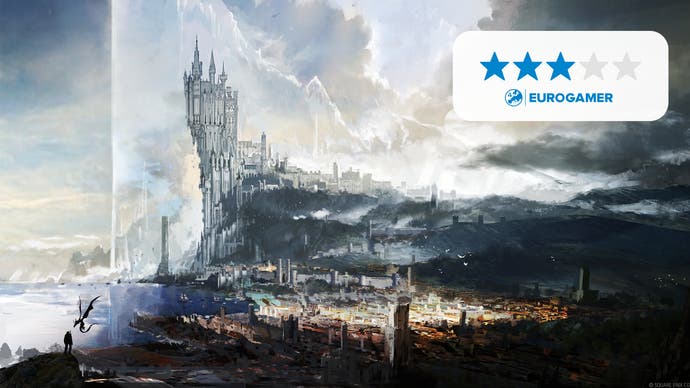Final Fantasy 16 review - easy to like, hard to adore
Ifrit bleeds...
The Final Fantasy games are so-called because the very first instalment was to be Square's swansong, its last release before going bankrupt. Another way of explaining that triumphantly ironic title is that each Final Fantasy is about journeying in the shadow of the final fantasy - the apocalypse. In being stories about saving the world, each game also asks you to spend untold hours living with the prospect of its demise. They all explore how people buckle or find themselves when they're obliged to exist in a climate of pervasive anxiety.
I think this atmosphere of encroaching crisis, with its abundant real world parallels, has played an unacknowledged role in Final Fantasy's appeal over the years. And it's this atmosphere, I think, that really binds together a series celebrated for constantly reinventing itself, from turn-based combat through rhythm-game spectacle to, in the case of Final Fantasy 16, a conflicted but enjoyable hack-and-slash with some engaging writing, beautiful if slightly soulless locations, and a heck of a lot of toing-and-froing.
Final Fantasy generally tells its story from the perspective of the younger generation, who must wrestle with a corrupt regime of tyrants and gods or would-be gods. In FF16's case, you play Clive Rosfield, buffest and gruffest son of the backwater duchy of Rosaria, whose younger brother Joshua is a Dominant - one of a privileged few who can channel the power of Eikons, mystical monsters inspired by the summons of previous games.
Clive and Joshua's story begins with an ignoble border skirmish for control of a Mothercrystal, a mountain-sized gemstone whose fragments confer magical powers - the latest of Final Fantasy's metaphors for fossil fuel. But their tale soon spills over to encompass the entire realm of Valisthea, a quasi-medieval continent threatened on the one hand by warring dynasties and their Dominants, and on the other by a spreading Blight that renders the earth unlivable. As in many Final Fantasies, this world's apocalypse is entangled with a goofy rendition of systematic injustice. People able to cast magic without using crystals are objects of fear and envy: they're branded at birth as Bearers, and treated as slaves. Also as in many Final Fantasies, there's a larger, metaphysical menace waiting in the wings.
It falls to grim and musclebound Clive - voiced by Ben Starr off Survivor, channelling Christian Bale's Batman - to make sense of the madness, one fetchquest at a time. After a generous prologue and some tragic twists, you set up shop in the middle of the world, sallying forth from a hub hideaway with crafting facilities and shops to separately loading regions. These consist of elegantly bustling settlements and moderately open, collectible-dotted plains, linked by lush paths and canyons, where you'll chat to people for quests that almost always see you ambling to a waypoint and fighting something.
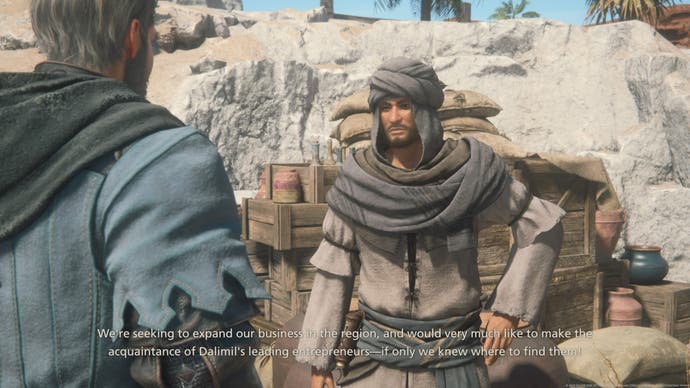
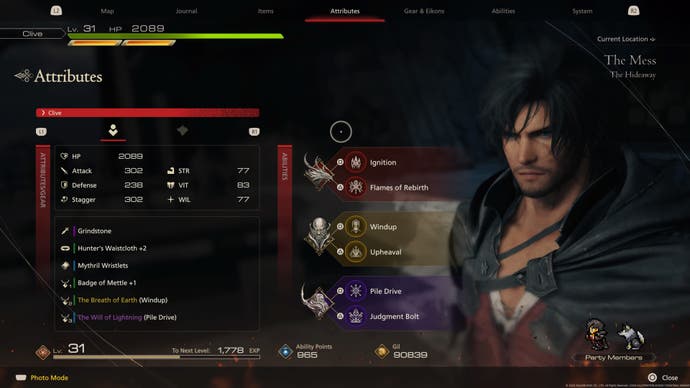

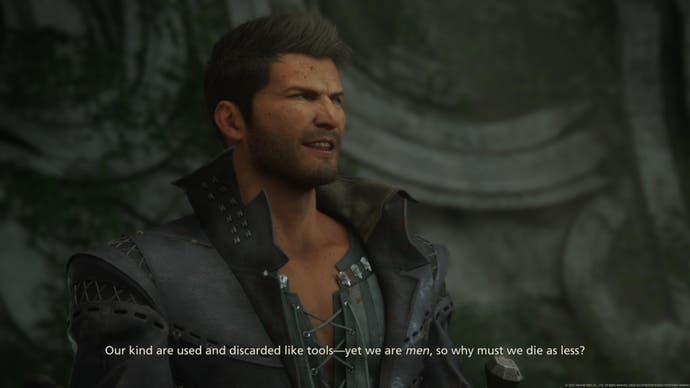
While he has ample stage presence, Clive is, to some extent, the Gordon Freeman-esque straight foil to a Christmas pantomime's worth of charmingly written and acted merchants, peasants, nobles and assorted randos, with English language localisation and voice-acting drawn from all across the British Isles. His role in the drama is to clobber things very hard so that plot can happen. But Final Fantasy 16 is also about making sense of him, not just of his anguished family backstory - which culminates during the first act with the literal button prompt "accept the truth" - but also of his status as another Chosen One protagonist, and of how this world exists simply to empower him.
It's difficult to say more without spoiling things, but Final Fantasy 16 is both the classic RPG tale in which you range around amping up your own legend so as to thwart Armageddon, and a story about how that concentration of agency isolates and alienates you, becoming a commodity that can be wrested out of your hands, much like the Mothercrystals over which Valisthea's nobles spill so much blood. At the (literal) end of the day, nobody can face the apocalypse alone, and those who think they can should be viewed with suspicion.
This theme echoes in the characterisation of the other Dominants and the realm's rulers, which takes heavy inspiration from the wanton backstabbing and ambient misogyny of Game of Thrones. They're a pack of emotionally damaged, overgrown children who spend their days fucking each other, fucking with each other, and fucking over their subjects against the backdrop of a calamity that requires a united front. The desire to both tell and critique the classic hero story comes across, too, in the game's trading of the traditional Final Fantasy party for a single-character action format, with Clive absorbing magical abilities from key people he meets or defeats, even as the plot gives this process of absorption a sinister dimension.
Other major characters do join you in battle - regulars include Jill, a tepid love interest gamely voiced by Susannah Fielding, and Cid, a twinkly rogue played by Game of Thrones star Ralph Ineson, who is sort of FFXII's Balthier except from Leeds. But save for your magic wolf, Torgal, who can be ordered to launch enemies and cast last-resort micro-heals with the D-pad, they're under AI control and largely serve only to distract or mop up any foes you're not targeting.

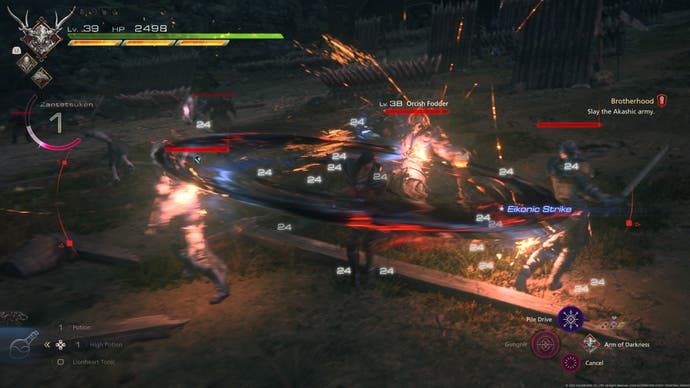
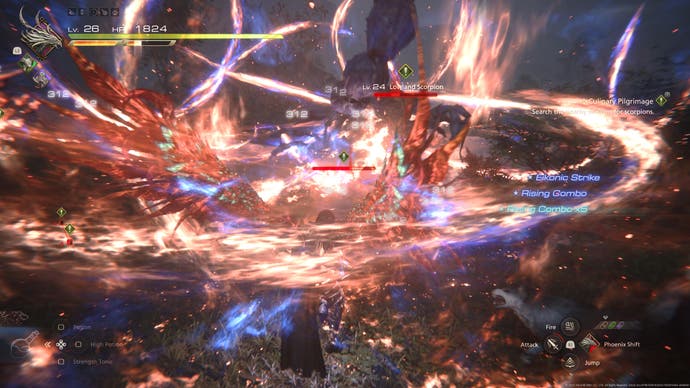
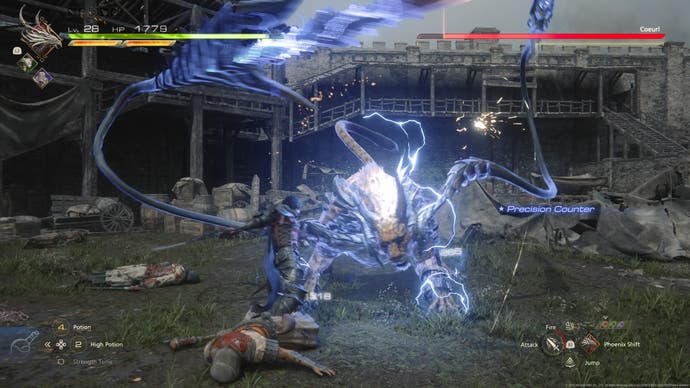
Final Fantasy 16's combat is a change of gear even from other action-oriented Final Fantasies like FF13 and FF15. It's essentially a more forgiving Devil May Cry, carried out in the same environments as exploration. Clive starts with basic sword swipes, a dodge, a counterattack and a few fire-based special moves, but gradually expands his arsenal with suites of four elemental abilities. You can equip up to three of these suites at once, switching between them with left trigger. There's not much in the way of melee combos, but there's a lot of variety in terms of special abilities, and you can eventually plug individual moves into different suites by spending extra XP to "master" them.
One, thunder-themed set lets you paint targets with electric orbs that detonate and chain together when struck. Another suite trades your default weapon for a blade of darkness which can be charged up by performing attacks to unleash a flurry of telekinetic strikes. Some suites are about crushing counterblows amplified by precision parries, others leave an ice crystal behind when you dodge, freezing anybody it touches. Some suites specialise in aerial warfare, others are about artillery bombardments and damage-over-time. You also unlock a new version of Final Fantasy staple Limit Break - a rage mode that heals you while amplifying your strength and speed.
There's room for a fair bit of theorycrafting, especially in New Game+ which introduces new and tougher enemy arrangements per area. You can equip and stack gear items to, for example, reduce cooldowns and amplify certain spells. But FF16 is also carefully designed to be approachable, with several checkpoints per bossfight, and items that automate actions like charging up projectiles. Clive doesn't have many direct healing skills beyond potions, but the game restocks the latter for free when you die. There's also a Stagger system which serves as a pacing device during longer, more overwhelming brawls. Similar to FF13, each major enemy has a bar that fills with damage and incapacitates them when full, granting you a few seconds to wail away without interruption. It creates welcome lulls while also encouraging you to hold a few special moves in reserve for these cathartic beatdowns.
The trouble with all this is that little word back there, "gradually". Where many hack-and-slash games can be polished off in 10 hours, FF16 stretches well beyond 30, even if you ignore the bulk of the sidequests, and it takes a while to get at the combat system's intricacies. The game teems with playtime-padding scraps against blameless wildlife and generic soldiers. While there's occasionally a supporting mage to spice things up, these foes are really just undergrowth to hack back enroute to the parts of the game that matter. You'll notice that they seldom bother to attack, preferring to circle about waiting for Clive to button-spam them out of their misery. The combat's saving grace here is its well-implemented autolock, which lets you lunge from body to body without paying attention.
The pervasive tedium is, however, offset by the scale and extravagance of the chapter-ending bossfights, which throw you up against a hair-raising assortment of laser dragons, war golems, galloping death knights and comet-summoning Behemoths. The best compare to bullet hell shooters in having you dance a path between beams and puddles of energy. And then there are the full-blooded, Power Ranger transformations and nuclear quick-time events that occur when fighting Dominants, which jettison the Devil May Cry comparisons and punt FF16 into the neighbourhood of Asura's Wrath. Some of these mega dust-ups unfold deep underground, others in orbit, and while it's occasionally impossible to see anything for damage numerals and blast clouds, they're also a shade more forgiving than the bosses you face on terra firma. The idea is to showboat and enjoy the fireworks.
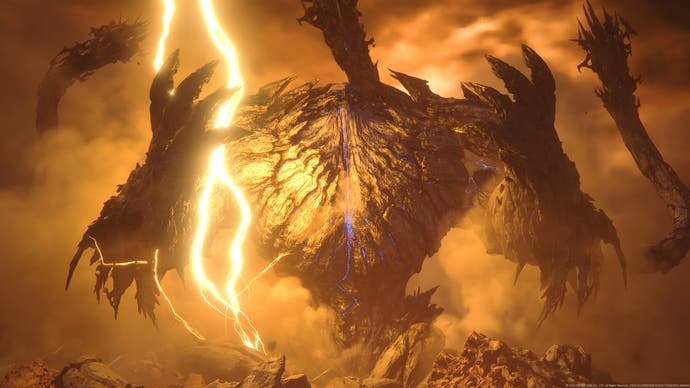
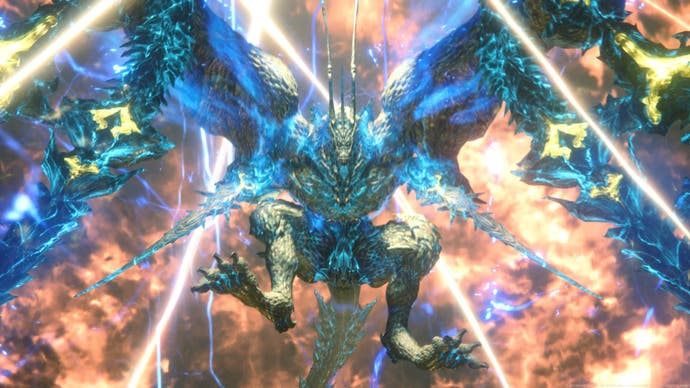
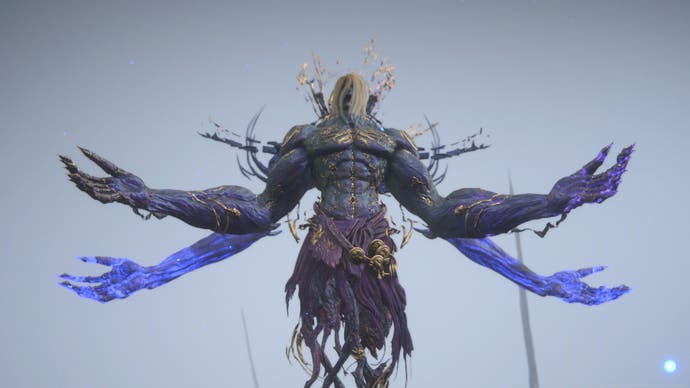
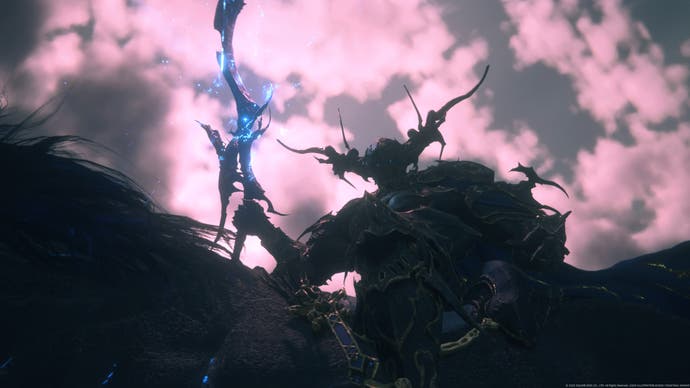
The quest design also has its ups and downs. The plot-centric missions are engrossing enough, though FF16 does sag into "visit the next themed dungeon to bosh the next big fish" territory after a promising first act, finding its feet belatedly in the closing 10 hours, once certain character stories have panned out and the ultimate villain of the piece has been exposed. I particularly relished investigating the spooky barren continent of Ash - a blend of Mordor and Boletaria from Demon's Souls.
There are a few enjoyable sidequests, too, which give you a chance to shoot the breeze with other key characters and flesh out personality dynamics hinted at in cutscenes. But the majority of these secondary activities are desperately boring, a chorus of complaints about obscure cooking ingredients, missing people and item deliveries which lead to yet more filler battles, with minimal narrative structure and few surprises. Sometimes all you have to do is walk across a courtyard to talk to somebody else, and you can practically smell the smoke pouring out of the writing team's ears as they struggle to cultivate some intrigue.
These errands do a fair job of fleshing out Valisthea's society, admittedly - every character, from the garrulous wineseller in one bazaar to the dying man you discover in one forgotten canyon, adds another, glinting thread to the world's tapestry. You'll chat to botanists about types of soil, oversee baroque construction projects, and trade thoughts with blacksmiths about the art of tanning leather. But it's a lot of repetitive legwork in return for morsels of anthropological data that could easily serve as loading screen marginalia.
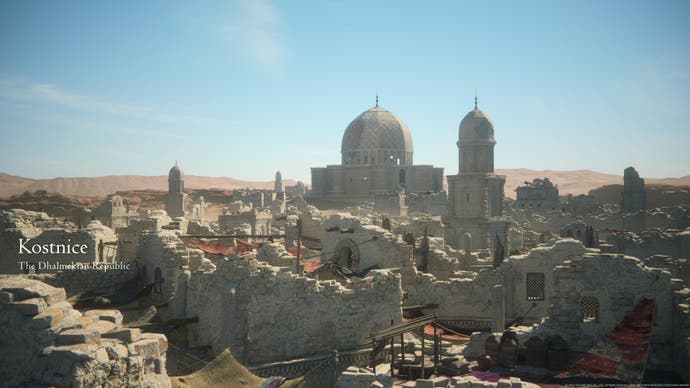
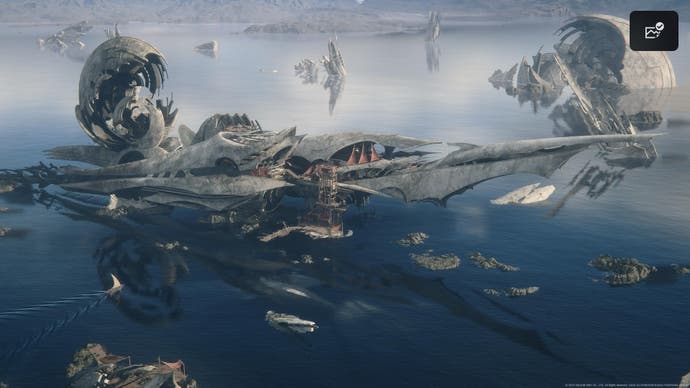
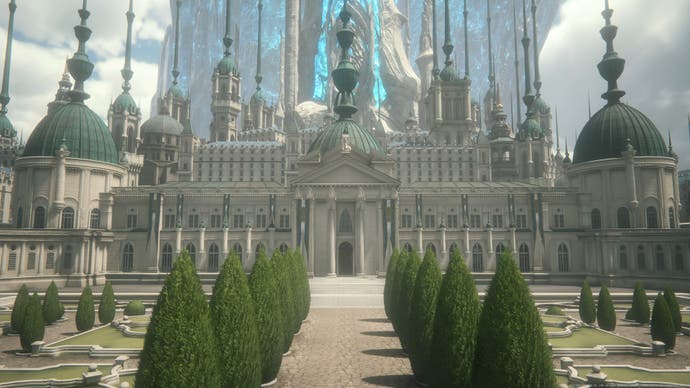
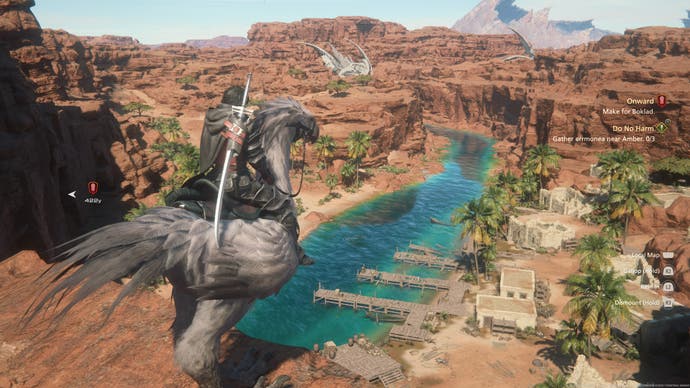
FF16's desire to worldbuild often gets the better of it, I think. Sidequest titbits aside, there's an embarrassment of systems to explicate the backstory - an "Active Time Lore" display with nested index cards, a perfectly mad piechart of cast relationships with a timeline of alliances and betrayals, and a character whose sole purpose is to deliver wanky Powerpoints on wider events. It's all grandiose rather than helpful and thankfully, you can mostly ignore it. The same can't quite be said of all those sidequests, which confer useful items, crafting materials and XP, and besides which, this is an RPG - sidequests are supposed to be the secret main attraction, right?
The worst quests have a corrosive effect on the game's locations, which are spectacular at first but don't really benefit from being revisited. FF16 opts for a "clean" high fantasy ambience that sternly rebuffs the sci-fi eccentricity of the last few FFs (the official marketing line, "the legacy of the crystals has shaped our history for long enough", is a poke in the eye for the seven-game Fabula Nova Crystallis subfranchise). This is a no-nonsense blend of magic and masonry with just a pinch of the otherworldly in the shape of buried ruins with fancy, disassembling doors - no mechs, no transforming swords, no violently clashing genre aesthetics, thank you kindly. It's undeniably sumptuous, but it can feel a bit dry. Some locations are mesmerising, but many consist of enervating swathes of greenery or dirt, and there's an austerity to the setpiece buildings that disappoints next to, say, FF9's Lindblum, let alone FF7's Midgar.
The world is also conspicuous for its ethnic homogeneity, which producer Naoki Yoshida has explained as a reflection of the "geographical, technological, and geopolitical constraints" of medieval Europe. Leaving aside the fact that there were Black and brown people in medieval Europe, this justification rings hollow given that several locations take open inspiration from north Africa and the Middle East, with towns that, for example, riff on Islamic architectural traditions and attire, but are predominantly or exclusively populated by anglophone white people (I hedge, here, simply because I haven't been around and talked to everybody). I find the deletion of people of colour from these spaces more sinister than the racial stereotypes of older Final Fantasies, particularly in a game that wants to talk about overcoming structural injustice and bringing people together. That "togetherness" is worth fighting for, but it's characterised here by what it excludes.
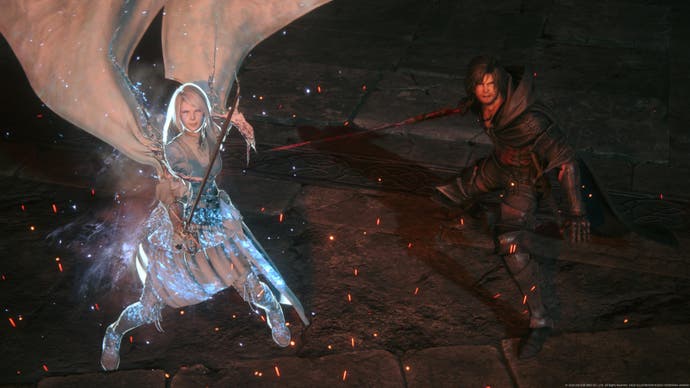
That contradiction speaks to the oddly self-cancelling nature of the story as a whole. Again, FF16 is on some level a playable deconstruction of the traditional hero yarn - its plot painstakingly explores how the urge to fight everyone's battles for them may disintegrate into egotism and even callousness, bred of thinking the world is yours to save. But the game's insistence on playing out the hero fable regardless is having your cake and eating it - certainly, it doesn't take 50 hours to grasp this moral. And while Final Fantasy 16 is perhaps the state of the art for real-time Final Fantasy combat, its dreary sidequests and slight excess of worldbuilding leave me reluctant to fire up New Game+. All told, I still prefer the older Final Fantasies, which also trade in stories of heroes averting the apocalypse, but always place those heroes second to the party.
